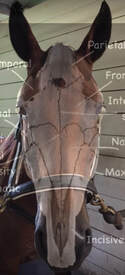 Cranial Anatomy The cranium of the horse is made of flat bones that articulate with each other through joints called sutures. These sutures allow the bones to move slightly leading to a slight expansion and contraction as the cerebral spinal fluid (CSF) is pumped through the cranium. The movement of these bones is the basis for craniosacral therapy. Cranial Bone Misalignments The cranial bones can become "jammed" due to trauma/injury or the process of traveling through the birth canal when the horse is born. When the bones shift and become "stuck" in this position, it will lead to decreased movement of the bones as the CSF is pumped through the cranium. This can ultimately lead to symptoms such as head aches, difficulty concentrating, runny eyes or nose, head shaking and other behaviors. Visually, it can be noted as asymmetry in the face. Re-aligning the Bones The cranial bones can be brought back in to proper alignment using specific craniosacral techniques to release the bones. Chronic misalignments will often take multiple sessions to resolve fully. Most horses will begin to show a decrease in symptoms following the first session. 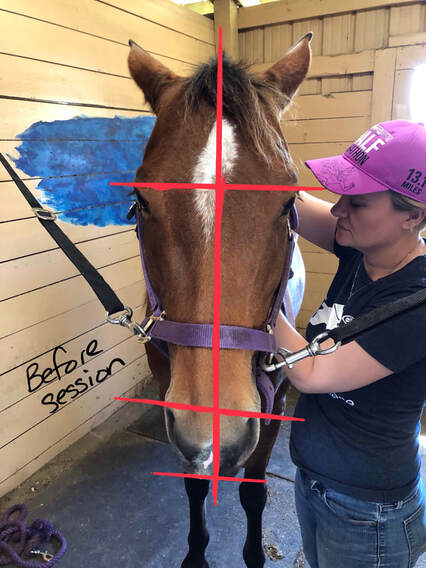 Looking for Asymmetries A good way to check for asymmetries is to take a picture of the horse's head when standing directly in front of them. You can then draw a line vertically from the mid section of the top of their head (by the poll) to the middle of their upper lip/nose. Next draw horizontal lines connecting the top of each eye and the top of each nostril. An additional horizontal line at the bottom of the lips can also be drawn. If the lines are all perpendicular to each other (create 90 degree angles) then the horse's skull is symmetrical. If 90 degree angles are not found, then asymmetry due to shifting of the cranial bones is present. Checking for Changes After releasing the appropriate cranial bones, you should then take another picture of the horse's head and re-draw the lines to determine if improvement has been made. This picture above, which was taken immediately after the first session, shows little improvement. Due to the chronicity of the symptoms and the small improvement, kinesiology tape was applied over the parietal and frontal bones and nasal sutures. The picture below shows the amount of asymmetry present following 24 hours of wearing the tape. Cranial Bone Releases - 2nd Session The kinesiology tape was left on another 24 hours (48 hours total) and then was removed before the second craniosacral session. During the second session, a sacral and tail release was performed before releasing the cranial bones. The picture below shows the results after the cranial bone releases were performed. Note a drastic improvement in the nasal and lip lines. Follow up This horse is experiencing a decrease in symptoms and an improvement in attitude. She will continue with monthly craniosacral sessions at this time to further improve facial symmetry, reduce the reoccurrence of symptoms and improve proper function. Special thanks to Mary Beth Nunes on her assistance in performing the primary CST session! Want to learn more about CST and the cranial bone releases?
4 Comments
Acupressure is the manual stimulation of specific acupuncture points. Acupuncture was developed in Ancient China with references to acupuncture procedures dating back to as early as 198 BCE. Traditional acupuncture utilizes thin needles that are applied to specific points to stimulate the energy flow. Acupuncture medicine teaches that all people and animals have energy channels running through their bodies called meridians. The flow through these meridians can become altered due to trauma, stress and environmental factors. Acupressure is a way to influence these meridians without the use of needles. Yes, animals can greatly benefit from acupressure!Acupressure is becoming more common as an animal therapy option for both small and large animals. Animals suffering from arthritis, stiffness, organ dysfunction, allergies, weakened immune systems and other ailments can benefit from acupressure sessions. Remember that acupressure (along with other forms of bodywork) should not replace veterinary medicine and you should always consult with your veterinarian before adding bodywork to your animal's health plan. Case Study from one of Our PractitionersWendy is a 24yo QH/TNWalker who has had issues with her cycle since she was in her teens. More recently, when she cycled, she’d get colic like pain to her flanks and would roll. Owner would call the vet to come out thinking it was colic, and Wendy would pass feces with no issues, and was given banamine. She is so bad with her cycle that she pees on the females in the pasture and would nudge like a male would on a female. -Opened using the Bladder meridian. Once began the process, Wendy immediately started licking and chewing. Did 3x each side. - Association Points - none of the points along the spine triggered a response. Slight response on BL20 BL 21 - Alarm points - she was reactivate CV4 and CV 5 and CV 12 . She would take deeper breaths when these were pushed. Which is interesting considering the CV is the source point we worked on. - Source point - Conception Vessel. She had great responses to these points. She’d breath deep especially on CV 4 5 and 12. She also liked the CV24 point too. - Closed the vessel with the bladder meridian again. She licked and chewed through this process too. I varied the speed as well. Horse appeared brighter and more content after the session. Prior to the session she seemed lazy or mellow. She was willing to do the session and when asked permission, she leaned into my chest with her head. Told Client to let me know if her mood has changed in field and whether her cycle has changed for the better. Will have the owner keep I touch and if need be, would do another session in a week or two. Since Wendy was so open and receptive to the treatment, it would be interesting that she had a blockage of energy that built up over time. A week later I did the same therapy with her to reinforce the release. Wendy had experienced a colic episode, although very slight in comparison to her other episodes. That was why I came out a week later. Since the 2nd session, she was free of any episode and her hormonal imbalances seemed to be in check. Her eratic behavior during her cycle was gone and she was a happier horse with the herd. ~Victoria Whitehead Want to learn more about acupressure?Tallgrass Animal Acupressure Institute in Colorado offers hands on and online courses in acupressure for both small animals and horses. They also sell high quality text books and charts.
|
AuthorDr. Angelique Barbara is the founder of Angel's Animals LLC, a company that has developed online animal bodywork courses for both owners and professionals. Dr. Barbara's unique teaching style along with the dynamic layout of the courses allows people of different educational backgrounds from all over the world to benefit from her knowledge. Archives
May 2024
Categories
All
|

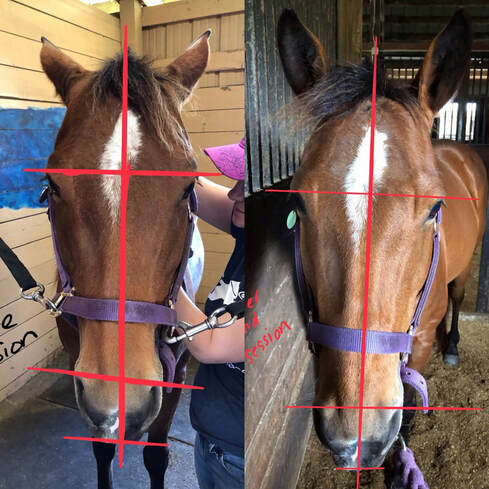
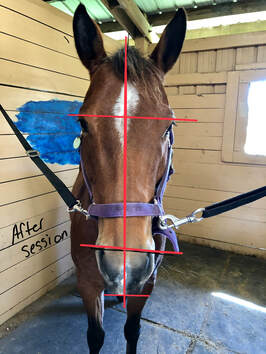
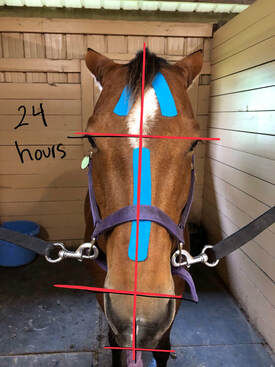
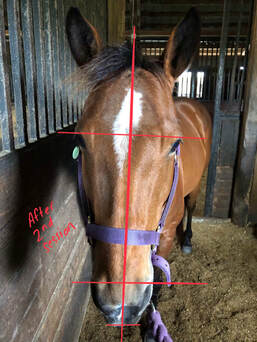
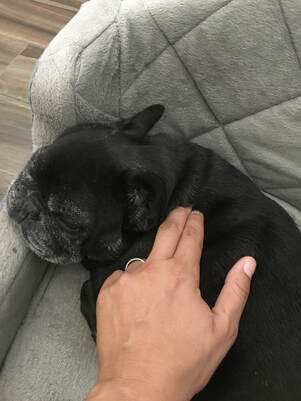
 RSS Feed
RSS Feed